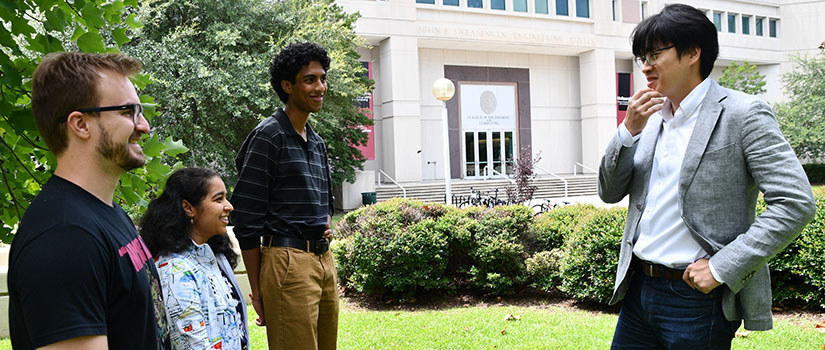Solving problems is at the heart of all research. But researchers usually endure multiple failures before enjoying the satisfaction of finding a solution. And while the solution may not be the perfect answer, discussions with colleagues and collaborators often provide valuable feedback.
Mechanical and Aerospace Engineering Assistant Professor Junsoo Lee has only been at the Molinaroli College of Engineering and Computing since 2022, but he has already made an impression with colleagues and students on working toward solving challenging problems.
Lee grew up in South Korea with an interest in aerospace engineering. However, at the time he was applying to universities, there were only 10 aerospace engineering programs (combined with mechanical engineering) in the country. He began his studies at Seoul National University in 2009, but his education was interrupted by required military service. His time in the military reignited his interest in aerospace.
“I was an Air Force translator between the Korean and U.S. forces. I met different people in the U.S. Air Force and my unit, where most of the soldiers were studying at foreign institutions. I also had a chance to see many aircraft such as F22 and U2 surveillance. This led to my interest in studying abroad for a higher degree,” Lee says.
Upon completing his military service, Lee returned to the university and began his research in system dynamics and control, which refers to analysis and modeling of a system that leads to designing a control system to guarantee optimality, robustness, and its stability.
“My motto is that everything needs feedback. “Naturally, I became interested in control because it's all about feedback since a sensor reads the signal and tries to change the actions,” Lee says.
Lee later earned his master’s degree in aerospace engineering at Seoul National University before coming to the U.S. to pursue his Ph.D. in aerospace engineering at Georgia Tech. Since his area of research heavily focuses on theory, he also pursued a master’s in applied mathematics, which is the foundation for his current research in systems control.
“System dynamics and control is not only specific to mechanical or aerospace systems. Not only do engineers in other disciplines use system modeling and control but also people in psychology or medicine use dynamics and control,” Lee says. “For instance, there is a rising interest in feedback control from medical researchers on how to automate the medical system, such as the ICU, in the future.”
The one keyword to represent Lee’s research is multi-agent systems. In an engineering perspective, this could refer to multiple satellites in space instead of one large satellite. While the small satellites have limited capacity, they can communicate with each other and achieve a common goal that is beyond a single agent’s capability.
According to Lee, multi-agent systems translate into swarm system, where 100 or more agents are involved.
“For example, if you have 1,000 agents, you cannot have a one central unit telling each one what to do. They need to make their own decisions based on limited information,” Lee says. “The question is, ‘How can we make sure that our multi agent swarm system works as a team and not breakdown?’”
Lee is working with his undergraduate research assistants on several multi-agent system projects. One is related to an extended autonomous mission. Instead of a short, automated mission with a duration of 20-to-60 minutes, the project is a 24-hour mission to determine which decision-making protocols are needed, and the best communication protocols and methods for controlling the system with minimal interaction with the human operator. Lee believes that this process could also be applied to a smart farming system.
“Crops cannot grow in a few hours. It requires a three-to-six month ‘mission.’ When the farmer starts the system, they don't have to worry about it for an extended period,” Lee says.
Lee is also involved in a project working with one of his other students on solving an optimization problem utilizing a particle smarm intelligence. One of the techniques currently being considered is particle swarm optimization, a bio-inspired algorithm that searches for optimal solutions in multidimensional spaces.
“Each particle represents a possible solution or an agent in an unknown environment,” Lee says. When they have limited sensing capabilities in an unknown environment, such as military vehicles deployed in hostile areas that need to communicate an enemy presence or hazards. We’re trying to figure out how we can optimize this control scheme.”
Travis Knight, chair of the Department of Mechanical Engineering, says that Lee takes the chaos of multi-agent systems and brings them to consensus in ways that are fascinating and wildly complex.
“Dr. Lee’s research on swarm control is like the proverbial problem of trying to herd cats but doing so with mathematical precision. It’s impressive how he wrangles unpredictable dynamics into something organized and stable,” Knight says.
Lee believes in the importance of bridging people from different backgrounds and providing leadership. This is apparent in his research and work with students.
“To be a good researcher, you need to be a good leader. Most of the time when you have your own group with students or postdocs, it's not just technical work. You need to create a working environment and chemistry where students can speak freely and express their feelings,” Lee says.
Moving forward, Lee intends to extend his work with students on undergraduate research projects and mentor them to provide an opportunity to decide which area is the best fit.
“Students should take advantage of the research infrastructure and resources that the university has. After starting in my faculty position, I realized that I needed students to work with because it's time consuming, ” Lee says. “If we can cultivate a culture of good undergraduate research, then we have a good pool of students who are willing to do the research and help us realize our ideas of future research.”
